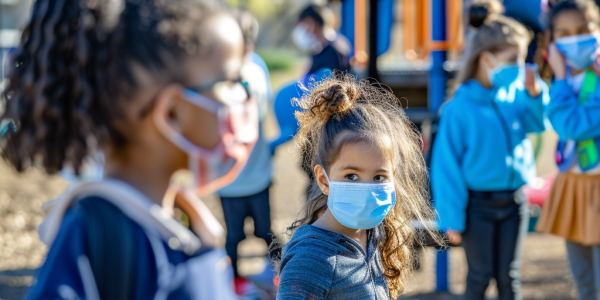Two Men Die from Rare Fungal Infection Linked to Bat Guano Fertilizer
Two men in Rochester, NY, tragically died from histoplasmosis after using bat guano as fertilizer for cannabis plants. This rare fungal infection highlights the health risks associated with handling bat feces. Health experts urge awareness and caution when using bat guano in gardening, advocating for proper education and regulatory oversight to prevent similar incidents.
Pasadena School Evacuates Classrooms After Teacher’s Death Linked to Legionnaires’ Disease
Seven classrooms at Pasadena Fundamental Elementary School in Pinellas County have been vacated following the tragic death of teacher Katherine Pennington from Legionnaires’ disease. The CDC warns that this severe pneumonia primarily affects vulnerable populations. As investigations proceed, health officials are ensuring safety measures and air quality tests to protect students and staff.
Massachusetts Health Officials Warn of Rising Whooping Cough and Pneumonia Cases Among Children
Health officials in Massachusetts warn of a rise in whooping cough and pneumonia cases, particularly among children and adolescents, as winter approaches. The Department of Public Health emphasizes the importance of vaccination and vigilance, urging families to be aware of symptoms and seek medical attention. With respiratory illnesses expected to increase, proactive measures are essential for community health.
CDC Recommends Pneumococcal Vaccination for Adults Aged 50 and Older
The CDC’s Advisory Committee on Immunization Practices has recommended pneumococcal vaccinations for adults aged 50 and older, expanding previous guidelines focused on those 65 and older. This pivotal change aims to protect more individuals from serious infections like pneumonia and meningitis, amidst evolving competition in the vaccine market.
Mapping Pathogen Spread Through Human Travel Patterns
Learn how researchers are tracking the spread and evolution of superbugs by combining genomic data with human travel patterns. Insights from the study could help predict and prevent future outbreaks, especially for pathogens like Streptococcus pneumoniae. Discover how initial reductions in antibiotic resistance linked to vaccines may be temporary, and how non-targeted strains resistant to antibiotics gain a competitive advantage.
Azithromycin Liquid Shortage Raises Concerns for Child Health
Learn about the shortage of azithromycin liquid, a commonly used antibiotic in pediatric care, and its impact on child health. Find out why the shortage is expected to persist until late November and how healthcare providers and caregivers are coping with the challenges of finding suitable replacements. Discover the importance of addressing supply chain issues and collaborating to ensure the availability of essential medications for vulnerable populations.
Man’s Near-Death Experience Highlights Dangers of Smoking Cannabis with Contaminated Water
A 25-year-old man in Connecticut faced a life-threatening situation after using a cannabis bong filled with water from a garden hose, leading to a rare and deadly lung infection known as Legionnaires’ disease. This incident sheds light on the dangers of using contaminated water sources in devices like bongs for substance consumption, emphasizing the need to be aware of the risks associated with bacterial infections, especially in the context of recreational drug use.
Sharp Increase in School-Aged Children Visiting NSW Emergency Departments for Pneumonia
Learn why the number of school-aged children visiting NSW emergency departments for pneumonia has increased dramatically during the pandemic. Doctors are urging families to wear masks and social distance to prevent the spread of respiratory illnesses. Find out about the common causes of pneumonia in children and how lockdowns may have impacted their immune systems.
Merck’s V116 Pneumococcal Conjugate Vaccine Shows Positive Data in Phase 3 Studies
Merck’s investigational 21-valent pneumococcal conjugate vaccine, V116, has shown positive data from multiple Phase 3 studies, offering potential clinical value to a range of adult populations. The vaccine has been found to be immunogenic for all 21 serotypes covered by the vaccine in various adult populations, including those at an increased risk of pneumococcal disease. If approved, V116 would be the first pneumococcal conjugate vaccine designed specifically for adults, providing confidence in its potential clinical value.
Health alert for legionnaires’ disease in Sydney CBD
Millions of people who visited Sydney’s CBD over Christmas and New Years are being urged to stay alert for symptoms of legionnaires’ disease after seven people were diagnosed with the debilitating lung illness. NSW Health issued a health alert on…










